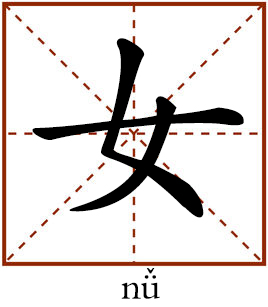Women

This character refers to women. It is also an important radical in Chinese characters. Characters with this radical often have something to do with femininity.
白头宫女在, 闲坐说玄宗
bái tóu gōng nǚ zài, xián zuò shuō xuán zōng
Baitou refers to white hair. Gongnü is palace maid. Xianzuo and shuo means to sit leisurely and chat. Xuanzong refers to Emperor Xuanzong of Tang (685–762), whose reign began well but ended in political disaster and personal tragedy.
These lines come from the poem “The Country Palace” by the Tang poet Yuan Zhen (779–831). “Here empty is the country palace, empty like a dream./ In loneliness and quiet the red imperial flowers gleam./ Some whited-haired palace chambermaids are chanting,/ Chatting about the dead and gone Hsuanchung regime” (translated by Lin Yutang). The last line of the poem is the key to understanding it, because it was during the reign of Xuanzong that the Tang Dynasty began to decline from its heydays of greatest prosperity and power. During the late stage of his reign, Xuanzong turned his attention to pleasure-seeking rather than the running of his empire. When Yuan wrote this poem, it had been several decades since the An Lushan Rebellion (755–763), which had greatly weakened the Tang and ended its golden age.
The country palace, which used to be bustling with dignitaries and royal family for pleasure seeking, has fallen into oblivion, empty and quiet. The young girls recruited into the palace as chambermaids during the reign of Xuanzong have become older. Blooming flowers inside the walls remind them of their fading youth. As days go by, they have nothing to do but sit down and chat about the past. Different from other poems that directly portray the change of the Tang Empire, the charm of this poem lies, in short, in its revealing the course of prosperity and decline of the country through the depiction of a forgotten palace. Those palace maids are witnesses and also the victims of the national calamity. Their grief for wasting a lifetime in such a forgotten corner represents the suffering of all the people that resulted from the failure of the ruler. In this poem, Yuan intended not only to express his sorrow over his motherland, but also to warn the successors of Emperor Xuanzong against committing the same errors again.
edited by REN GUANHONG
